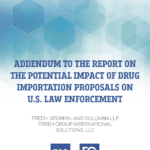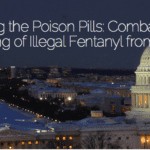Legislation
Former FBI Director Louis Freeh Updates His 2017 Report on the Threat of Congressional Drug Importation Proposals
Former FBI Director Louis Freeh has released an addendum to his 2017 Report on the Potential Impact of Drug Importation Proposals on U.S. Law Enforcement, concluding:
…the government has not done enough to evaluate and improve the capacity of law enforcement to deal with a new pipeline of drugs into the U.S. drug supply, all while . . . more illegal drugs are being shipped to the United States. Passing any drug importation scheme would erase the little progress we have made and set law enforcement further back on their heels.
[...]Importation Is Too Risky, Warns Former FDA Associate Commissioner
In a January 23, 2019 editorial published in The Hill Peter Pitts, a former FDA associate commissioner and the president of the Center for Medicine in the Public Interest, explains why the safety risks of importation far outweigh any savings.
[...]Partnership for Safe Medicines’ Statement on New Drug Importation Bills
Washington, D.C. (January 10, 2019) – Marv Shepherd, President of the Partnership for Safe Medicines, released the following statement today in response to new legislation, the “Affordable and Safe Prescription Drug Importation Act,” and the “Safe and Affordable Drugs from Canada Act of 2019” which would allow medicines to be imported into the United States…
[...]The STOP Act Will Be A Critical Tool In The Detection Of Illegal Substances In International Mail Shipments
The board members of The Partnership for Safe Medicines praise the passage of the Substance Use-Disorder Prevention that Promotes Opioid Recovery and Treatment for Patients and Communities Act” or the “SUPPORT for Patients and Communities Act, which includes the STOP Act. This legislation will have a positive impact on the fight to save lives and keep fentanyl out of the United States…
[...]New Laws Of The Land Will Let Pharmacists Tell Their Customers How To Lower Their Prescription Costs
Two bills recently signed into federal law will help American citizens lower their prescription costs by banning the practice of pharmacy gag rules. S.2554 went into effect immediately and applies to anyone who purchases insurance on an exchange or gets their insurance through an employer. S.2553 will go into effect on January 1, 2020 and applies to anyone on Medicare…
[...]Stopping The Poison Pills: Senate Caucus Hearing Held To Discuss Fentanyl
The Senate Caucus on International Narcotics Control held a hearing on October 2, 2018 to discuss the flow of illicitly produced fentanyl out of China and into the United States, Canada, and Mexico. Discussions with panelists involved what is currently being done by major departments within our government to keep fentanyl out and what more could we be doing to help end this epidemic…
[...]Partnership For Safe Medicines Urges Passage of the STOP Act to Increase Inspections for Dangerous Synthetic Opioids
Partnership For Safe Medicines Urges Passage of the STOP Act to Increase Inspections for Dangerous Synthetic Opioids Legislation will increase surveillance of primary smuggling route for fentanyl WASHINGTON (May 24, 2018) – The Partnership for Safe Medicines (PSM) today urged passage of the Synthetics Trafficking and Overdose Prevention Act of 2017 (S.372), also known as…
[...]Making Canada America’s Medicine Cabinet Is Not The Solution To High Drug Prices
Marv Shepherd, President of Board of Directors for the Partnership for Safe Medicines, reexamined the possible effects on Canada’s drug supply should the U.S. legalize drug importation…
[...]US Will Be Exposed to Counterfeits From Weak European Drug Security Warns Expert
In early July, European authorities reported that counterfeit versions of Omnitrope, a drug containing human growth hormone, were found in France, Denmark, and Mexico. The counterfeit Omnitrope was designed to look like it was made by a large drug manufacturer, but it contained no active ingredient. Shortly thereafter, German authorities announced that a fake version of a schizophrenia drug, Xeplion, was discovered in Germany. The Xeplion was also a knock-off, mimicking packaging used in Bulgaria and Romania.
These incidents are the latest in a stream of reports about counterfeit drugs throughout Europe. The problem lies in lax security of the supply chain — distributors, middlemen and wholesalers between the drug maker and the consumer. Despite ongoing problems with the EU drug supply chain, Congress is currently considering a bill that would open the U.S. to imports from the EU and elsewhere. We can’t have a serious debate about drug importation without understanding what is going on in Europe.
[...]Health Policy Expert: “Why Cheaper Drugs Can Kill”
Health policy expert Kenneth Thorpe weighs in on the dangers of drug importation in this August 23, 2017 editorial in U.S. News & World Report:
“…these savings could come at the cost of Americans’ lives. Legalizing drug importation would make it far easier for harmful counterfeit and contaminated medicines to enter the U.S. drug supply. At a time when illegal, counterfeit drugs already cause hundreds of American deaths every year, importation represents a reckless way to cut health care costs.”
[...]





